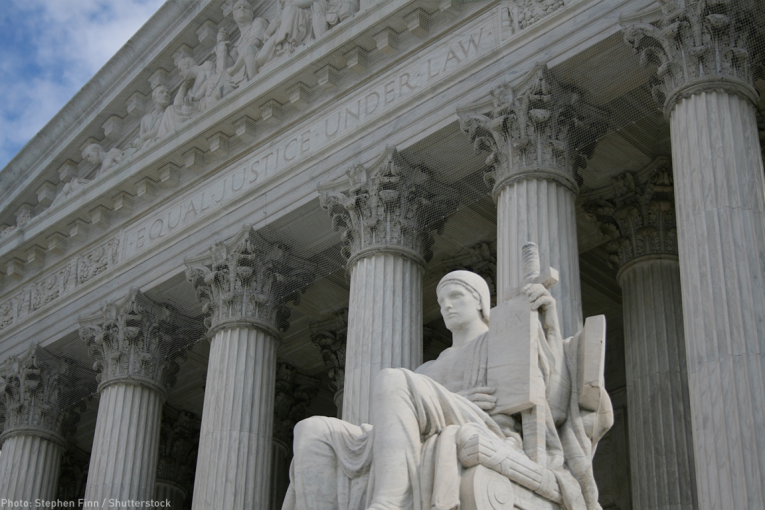
 By Jaanvi Kaur
By Jaanvi Kaur
WASHINGTON, DC – Civil rights groups are trying again to push the federal government into overruling century-old Supreme Court decisions that racially discriminate against individuals residing in U.S. territories like Puerto Rico.
Last week, groups such as the American Civil Liberties Union, Hispanic Federation, Latino Justice, PRLDEF, and Equally American launched a campaign to overturn these cases, which they say have created and upheld a series of inequalities in the rights of those in the U.S. territories versus the states.
The early 1900s court decisions were made by those justices who legalized racial segregation in cases like Plessy v. Ferguson after Puerto Rico became a U.S. territory after the 1898 Spanish-American War. These decisions created the notion that the individuals residing in these territories were “alien races” and “savage tribes,” the ACLU and others contend.
The campaign to overturn the Insular Cases began a month after the Supreme Court used them as legal precedent in a decision that constitutionally denied federal benefits to aged and disabled U.S. citizens residing in Puerto Rico. The decision also held that they can, however, could access federal benefits by relocating to the states.
“The time is now for the court to overrule the Insular Cases,” Alejandro Ortiz, senior staff attorney at the ACLU’s racial justice program, said Tuesday. “They justify continuous maintenance of U.S. colonies.”
These cases have allowed Congress and the federal government to haphazardly treat U.S. territories like Puerto Rico as foreign for domestic motivations and as a state for international purposes, the ACLU added.
For instance, Puerto Ricans can be enlisted and may serve in the U.S. military, however, those residing within the territory cannot vote in presidential elections and they don’t have any Congress members with voting power. The same reasoning was utilized to rationalize the disparities in financing public programs like Medicaid and food stamps for Puerto Ricans.
According to the Justice Department, Puerto Ricans are “generally exempt from most federal taxes, including the income tax, excise taxes, and estate and gift taxes.” However, they still pay federal payroll taxes and contribute to the funding of public programs like Medicare and Social Security. They contribute more than $4 billion annually in federal taxes to the U.S.
Last month, in the decision delivered by Justice Brett Kavanaugh, the court found that Congress’ decision to exclude Puerto Rico from most federal taxes “supplies a rational basis” to also keep them from the Supplemental Security Income benefits program (SSI).
The only justice to dissent from this decision was Justice Sonia Sotomayor, who is of Puerto Rican descent.
She describes the exclusion of SSI to Puerto Ricans residing on the island as “especially cruel” since “Puerto Rico has a disproportionately large population of seniors and people with disabilities.”
In her dissenting opinion, Sotomayor wrote, “There is no rational basis for Congress to treat needy citizens living anywhere in the United States so differently from others. To hold otherwise, as the Court does, is irrational and antithetical to the very nature of the SSI program and the equal protection of citizens guaranteed by the Constitution.”
Advocates under this new campaign seek to raise the momentum they had initially when 13 groups urged the Department of Justice to publicly denounce the Insular Cases.
In February, the civil rights groups, in a letter delivered to Attorney General Merrick Garland, stated that this action should be part of President Biden’s efforts to push racial equity through executive orders he signed in January.
Following the latest Supreme Court decision, Puerto Rico, along with the U.S. Virgin Islands, Guam, and American Samoa, all lack access to the benefits of SSI. However, through congressional action, these same benefits have been given to the District of Columbia and the Northern Mariana Islands.
Vice president of federal policy and advocacy at the Hispanic Federation, Laura Esquivel, stated that Congress must give Puerto Rico the SSI benefits during this term in the same way they did with the Northern Mariana Islands and the District of Columbia.
Esquivel stated, “It either happens now, or it doesn’t happen for the foreseeable future.”
While the President has promised to “ensure residents of Puerto Rico have access to [SSI] benefits,” the Biden administration decided to continue to push for the reversal of a U.S. Court of Appeals ruling from the Trump era that deemed the practice of excluding Puerto Ricans from SSI benefits as “invalid.”
The Supreme Court sided with Biden’s Department of Justice, finding that the denial of benefits was not unconstitutional.
In a statement made by President Biden in June, he defended the actions of the Department of Justice and states that it “has a longstanding practice of defending the constitutionality of federal statutes, regardless of policy preferences.”
Biden also said Puerto Ricans “should be able to receive SSI benefits” and urged Congress to amend the Social Security Act to include them.
